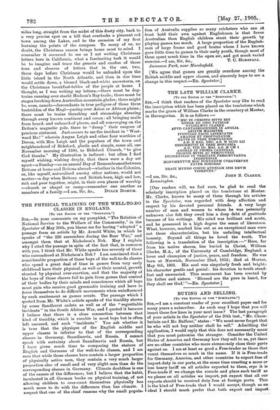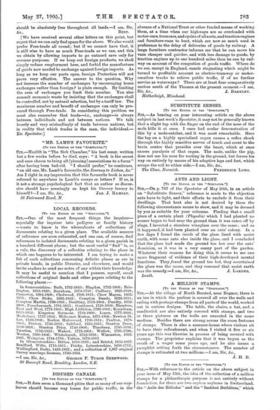BUYING AND SELLING.
IT° THE EDITOR OF TIlE " SPECTATOR:9 SIE,—I am a constant reader of your excellent paper and for many years a subscriber. As such may I hope that you will insert these few lines in your next issue P The last paragraph of your article in the Spectator of the 20th inst., "Mr. Cham- berlain and Mr. Balfour," states; "We must never forget that he who will not buy neither shall he sell." Admitting the' application, I would reply that this does not necessarily mean that you must patronise the stranger. Consider the United States of America and Germany how they sell to us, yet there are no other countries who more strenuously cies° their ports against us. I am at least as good a Free-trader as those that vaunt themselves so much in the name. If it is Free-trade for Germany, Americas and other countries to export free of import-duty in our ports, at the same time exacting a more or less heavy tariff on all articles exported to them, ergo it is Free-trade if we change the rounds and place such tariff as we please on all articles we import, yet expect that all our exports should be received duty free at foreign ports. This is the kind of Free-trade that I would accept, though as an ideal I should much prefer that both export and import
BEST.
[We have received several other letters on this point, but regret that we can only find space for the above. We also would prefer Free-trade all round; but if we cannot have that, it is still wise to have as much Free-trade as we can, and this obtain by allowing imports to go untaxed save only for revenue purposes. If we keep out foreign products, we shall simply reduce employment here, and forbid the manufacture of goods now needed to exchange against foreign imports. As long as we keep our ports open, foreign Protection will not prove very effective. The answer to the question, Why not increase the number of exchanges by encouraging home exchanges rather than foreign ? is plain enough. By limiting the area of exchanges you limit their number. You also commit economic waste by insisting that the exchanges shall be controlled, not by natural selection, but by a tariff law. The maximum number and benefit of exchanges can only be pro- cured through Free-trade. In considering this problem we must also remember that trade--i.e., exchange—is always between individuals and not between nations. We talk loosely and very misleadingly of trade between nations, but in reality that which trades is the man, the individual.— ED. Spectator.]







































 Previous page
Previous page